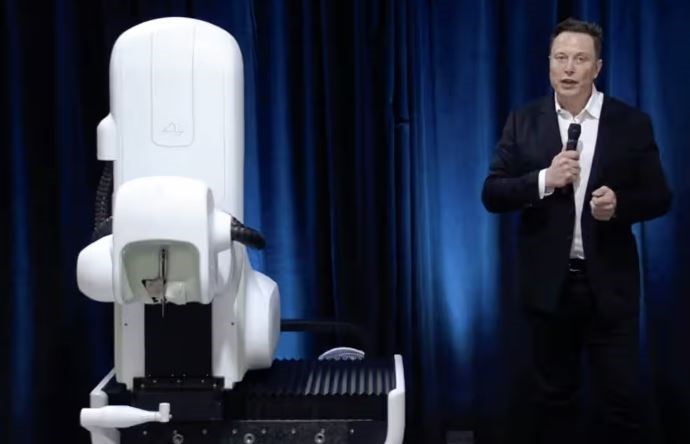Neuralink receives approval for human brain-implant trial recruitment
The trial aims to involve individuals with paralysis in a six-year research endeavor.
-

Elon Musk standing next to a surgical robot during his Neuralink presentation on August 28, 2020 (Neuralink/AFP via Getty Images)
Neuralink, Elon Musk's venture focused on brain implants, has announced that it has obtained approval from an independent review panel to commence the recruitment of participants for its inaugural human trial. In this six-year research initiative, Neuralink is looking for individuals with paralysis to evaluate its experimental device.
Neuralink is just one of the numerous companies working on the development of a brain-computer interface (BCI) capable of gathering and processing brain signals. However, the extravagant promotion of the company by its billionaire CEO, including commitments to create a comprehensive brain-computer system to augment human capabilities in response to artificial intelligence, has generated doubt and ethical apprehensions among neuroscientists and other professionals in the field.
In the previous year, the Food and Drug Administration (FDA) declined Neuralink's request for expediting human trials. However, in May, the FDA granted Neuralink an investigational device exemption (IDE), permitting the use of their device in clinical studies. The FDA has not revealed the specific details of how the initial concerns were addressed.
Neuralink is actively seeking individuals who have quadriplegia resulting from either vertical spinal cord injuries or ALS (Amyotrophic lateral sclerosis) as potential study participants. These individuals will undergo a surgical procedure where a brain-computer interface (BCI) is implanted into a specific brain region responsible for controlling movement.
The ultimate objective is to empower these participants to manipulate a computer cursor or keyboard solely through their thoughts. The study's primary focus is to assess the safety and effectiveness of this technology, as stated in their announcement.
The company's recent announcement follows the receipt of regulatory approval for a trial, but it arrives after facing scrutiny for its previous animal testing efforts. Reports have emerged suggesting that these trials inflicted unnecessary suffering on the animals involved.
Former employees have described these tests as subpar and unprofessional, with one instance being the incorrect placement of the device in pigs, resulting in the need to euthanize them.
The accusations prompted various investigations, including one by the Department of Agriculture regarding animal mistreatment and another by the Department of Transportation concerning the improper handling of biohazardous materials across state boundaries.
Even if their device is found to be safe for human use during the trial, it could still be many years before it receives clearance for use by patients who are not part of the trial.
Read more: Neurotechnology to be industrialized for medicine and more

 3 Min Read
3 Min Read








